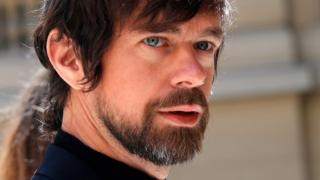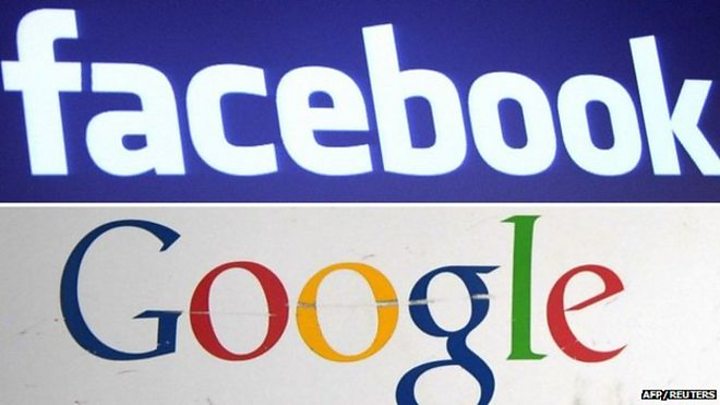[ad_1]

Image copyright
Reuters
Jack Dorsey said details would follow in November
Twitter is to ban all political advertising worldwide, saying that the reach of such messages “should be earned, not bought”.
“While internet advertising is incredibly powerful and very effective for commercial advertisers, that power brings significant risks to politics,” company CEO Jack Dorsey tweeted.
Social media rival Facebook recently ruled out a ban on political ads.
News of the ban divided America’s political camps for the 2020 election.
Brad Parscale, manager of President Donald Trump’s re-election campaign, said the ban was “yet another attempt by the left to silence Trump and conservatives”.
But Bill Russo, spokesman for the campaign to elect Democratic front-runner Joe Biden, said: “When faced with a choice between ad dollars and the integrity of our democracy, it is encouraging that, for once, revenue did not win out.”
Reacting to the move, Facebook founder Mark Zuckerberg defended his company’s policy.
“In a democracy, I don’t think it’s right for private companies to censor politicians or the news,” he said during a conference call with journalists.
Twitter’s ban will be enforced from 22 November, with full details released by 15 November.
How does Dorsey justify the ban?
Mr Dorsey explained his position in a thread of tweets.
Internet political ads, he said, presented “entirely new challenges to civic discourse”.
These challenges included “machine learning-based optimisation of messaging”, “micro-targeting, unchecked misleading information, and deep fakes”.
“It’s not credible,” he wrote, “for us to say: ‘We’re working hard to stop people from gaming our systems to spread misleading info, but if someone pays us to target and force people to see their political ad…well…they can say whatever they want!'”
Countering the argument that the new policy might be seen as favouring leaders already in office, he pointed out that “many social movements reach massive scale without any political advertising”.
Ads in support of voter registration would not be affected by the ban, he added.
How is news of the ban playing out?
Hillary Clinton, the former Democratic candidate who lost to Mr Trump in the 2016 presidential election, welcomed Twitter’s ban and appeared to challenge Facebook to rethink its stance.
Social media analyst Carl Miller said it was “one of the first times a tech giant has stepped back in concern for the enormous disruptions they’re doing to the institutions that don’t move as quickly as them”.
Jack Dorsey’s decision is more significant for its timing and the principle it upholds than the practical effects it will have on modern democracy.
Political ads on Twitter are just a fraction, in scale and impact, of those on Facebook. Mr Dorsey knew – and his chief financial officer has since confirmed – that this decision would have little impact on the company’s bottom line.
They therefore calculated that they could win a thumbs up from regulators and public opinion at little cost to the business.
And they could also mischievously provoke Facebook, who are in a more difficult position on the subject. It cannot be mere coincidence that Mr Dorsey’s tweet was just a fortnight after Mark Zuckerberg’s speech on the same subject.
A dividing line between the companies is useful for Twitter. It puts the onus on Facebook to once again defend its stance.
It is very easy to find damaging or deceitful ads online. But asking Californian companies to decide what should or shouldn’t be in the public domain grants them enormous power that is hard to undo. They already make such decisions on things like violent or hateful content; asking them to go further is, in effect, turning them into editorial arbiters of public conversation.
That is, journalists.
What is Facebook’s policy?
Earlier this month, Mr Zuckerberg went before an audience of students in Washington DC to defend the firm’s decision not to ban political adverts that contain falsehoods.
He had considered barring all political ads on his platforms, but said he believed the move would favour incumbent politicians and whoever the media chose to cover.
The company should “err on the side of greater expression”, he argued.
Image copyright
Facebook
Zuckerberg gave his speech to an audience of students and others at Georgetown University in Washington DC
Another spokesman for Mr Biden had criticised the firm for refusing to remove a video posted by Mr Trump’s 2020 re-election campaign which promoted an unproven conspiracy theory involving the former vice-president and his son.
“It is unacceptable for any social media company to knowingly allow deliberately misleading material to corrupt its platform,” TJ Ducklo said.
Fellow Democratic candidate Senator Elizabeth Warren then paid to run an intentionally misleading advert on Facebook that claimed Mr Zuckerberg had personally endorsed Donald Trump for re-election.
She said she had done so to protest against the firm’s decision to allow politicians to run ads containing “known lies”.
How much impact will this have on the US election?
US federal campaigns are expected to spend about $6bn (£4.6bn) on advertising but most of it will go on TV ads, with about 20% put into digital ads, advertising research firm Kantar estimates.

Media playback is unsupported on your device
Twitter is also much smaller than Facebook. In February, it said it had 126m daily active users while Facebook boasted 1.63bn in September.
Meanwhile the BBC’s political editor Laura Kuenssberg said political strategists often counted on their message being spread for free.
[ad_2]
Source link

